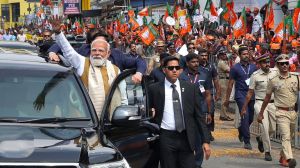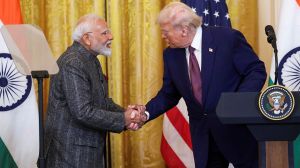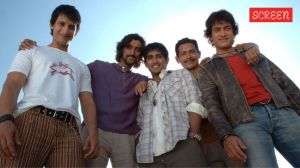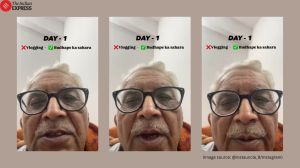The Voice
A second is a long time; even silence can be eloquent if needed. An adage which India's radio man, Amin Sayani, turned into a tenet for th...

A second is a long time; even silence can be eloquent if needed. An adage which India8217;s radio man, Amin Sayani, turned into a tenet for the medium he loves the most: obviously, the radio. In the Fifties, he used each second of his air time on Wednesdays at 8.00 pm for Binaca Geet Mala to magnetise millions to Radio Ceylon. And a voice was personified. Some pictured him to be tall and good looking. Others thought he was ordinary like them. Yet they all perceived him as a celebrity. Sayani had, literally, taken the radio by storm. Even today, however hard he may try not to, his voice resonates with his characteristic bhaiyon8230; aur behno.
Though in the context of those days 8212; when All India Radio studios were not competently sound-proof and he had to be unusually animated 8212; his approach clicked, Sayani prefers to be more personal today. quot;There are other ways you can make the listener feel that he alone is sitting in front of the speaker. Like sargoshian whispering between goodfriends, where you don8217;t make a racket but speak in a natural voice that smiles,quot; he says, not wasting any radio time, yet drooling over each word lovingly. Like when he performed short plays in Modi Sangeet Kahani. But that was the Fifties8217; boom time and even Sayani couldn8217;t get AIR its listenership which fell in the early Eighties.
The man who tried his best to reinvigorate the medium all the four decades of his air life, Sayani is coping well with the so-called oblivion that television has brought his way. Running a course in radio training, he operates from his Colaba office, next to Regal building. quot;I want to put to use my varied experience at the Sri Lanka Broadcasting Corporation, BBC8217;s ethic radio, AIR, Radio Asia and Saudi Arabian station Umm-al-Quwain. Last month, Sayani also tried organising a 15-day course in public service programming. quot;I had K. Nalinakshan, Roger Pereira, former police commissioner Satish Sahni and Gerson da Cunha lined up to speak on public services and awareness, butsomehow the subject has not caught up with the people,quot; he talks of the course that fizzled out because there were not enough people interested.
quot;This is where AIR8217;s primary channels are strong. They reach the interiors with some good public service programmes, in a slightly traditonal fashion though,quot; says Sayani, switching on to his grudge against the AIR, which, he says, felt pride in not publicing the exemplary. quot;AIR FM came in 14 years prior to licenced FM. But no one knew about it. In fact, till the Fifties we were on par with the BBC. And then the medium stifled itself. It was not allowed to grow,quot; says Sayani unhesitantly, giving his vote to propaganda, his each word calculated; the way he prepared for his programmes. quot;In the early Eighties, sponsored programmes made Vividh Bharti a livewire programme. This was when TV was also attracting sponsorship. But our good old AIR increased the rates by 500 per cent. This is not the way one works,quot; says the man who made listening to music fun with the firstever countdown show 8212; Binaca Geet Mala, the only hit after its English version Binaca Hit Parade.
quot;In 1952, Radio Ceylon took cue from Binaca Hit Parade and started Geet Mala, a selection Hindi songs with a contest,quot; says Sayani, remembering why he agreed to anchor it 8212; he had learnt Indian classical music and used to sing till his voice cracked. quot;And when the letters for the contest became too much to handle the number rose from 6,000 to 90,000, we cut out the mail part and decided to make it a countdown hour,quot; he talks of how staid he found the idea of the same songs going up and down. And then Sayani created the sangeet seedhi with pehli, doosri paydaan first, second.. rung. quot;Majrooh Sultanpuri one day pointed out that paydaan is a masculine word and it should be pehla, doosra8230; paydaan. And my repartee was how can we have a big female and a small male8217;,quot; he says chuckling at his own politically incorrect words.
Ghalatul aam wasithe Urdu phrase means: if the wrong thing becomes popular, it becomes sophisticated8217;. And the popular has become faddish these days. quot;Today countdowns have lost their meaning. Which one8217;s correct? And then there seems to be a slight influence from the music companies on what goes on air,quot; he ridicules the drift where the numbers are not the ones in the films. quot;They are trailers, interspersed with asinine or inane talk. And how they feign popularity!quot; he jibes, recalling how for 35 years he, with B R Chopra and G P Sippy, saw that Binaca8230; was not manipulated. quot;All this will be left behind when web radio takes over,quot; Sayani takes a leap into the future with yet another interesting phenomenon. quot;It will soon catch on. The only glitch is it takes irritatingly long to download a song in India. It has to be a little more sophisticated to be liked.quot; And though Sayani will soon get involved in Web radio in his own singular way, he feels radio will always give TV a run for its money with its commuter andmorning time advantage.
And if privatisation works 350 people have already bid, Sayani will be proved right with every city having 10-12 stations to begin with. quot;I don8217;t know how many years I will live, but I wish I live to see 20,000 channels in the country.quot; So a shift to TV is ruled out? quot;I will not shift. I will take the radio to TV, to the web.quot;
- 01
- 02
- 03
- 04
- 05































